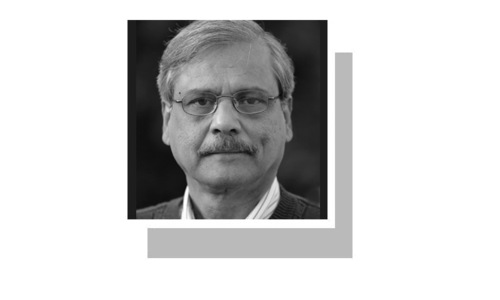• Questions raised about timing of decision amid attempts to pass a constitutional amendment
• SCBA, PBC hail verdict, IBC laments ‘favour to govt’
ISLAMABAD: The legal community seemed divided in its appraisal of Thursday’s Supreme Court decision on Article 63A of the Constitution, which deals with the disqualification of lawmakers voting against the party lines.
While lawyers’ central bodies — the Supreme Court Bar Association (SCBA) and Pakistan Bar Council (PBC) — expressed satisfaction over the decision, the Islamabad Bar Council (IBC) said the verdict would favour the incumbent government, which is trying to get a controversial constitutional amendment passed by parliament.
The earlier decision, by a bench led by former chief justice Umar Ata Bandial, virtually made the constitutional provision that deals with defection redundant in four instances: the election of a prime minister and/or a chief minister; a vote of confidence or no-confidence; a Constitution amendment bill; and the budget.
The provision restricts the voting powers of lawmakers by making the party head’s decision binding on them. Under Article 63A, any lawmaker who violates the party line is disqualified from parliament and loses their seat.
Under the previous order, such votes would not be counted.
The fresh ruling, which came on a review petition instituted by the SCBA, means that in the future, the votes of defecting lawmakers will be counted.
SCBA President Shehzad Shaukat expressed his joy in the courtroom when the review petition was accepted.
The PBC, the apex regulatory forum of the lawyers across the country, said the earlier decision was unjust as it penalised the defecting lawmakers whose votes were not counted.
Meanwhile, Qazi Adil Aziz, the IBC vice chairman, said the apex court should have deferred the hearing of the matter.
He added that the decision came at a time when the ruling coalition was “making all-out efforts” to pass constitutional amendments to set up a Federal Constitutional Court and modify the process of appointment, posting, and transfer of superior courts’ judges.
He said the lawyer bodies of Islamabad will hold a convention on Oct 7 and hoped that lawyers from across the country would join their “movement for the rule of law”.
PBC Vice Chairman Farooq H. Naek said the five-member bench reviewed the matter in the light of the international practice and parliamentary norms of Western countries where casting votes against the party line is “customary”. He said that disqualification for not toeing the party position is a concept in South Asian parliamentary systems.
According to him, the court rightly held that the judgement of 2022 was “flawed”.
When asked about the upcoming convention by Islamabad-based lawyers, Mr Naek said PBC, being the supreme bar council, was not consulted by the local bodies.
‘Questionable timing’
Senior lawyer Sardar Asmatullah said though the decision’s timing could be questioned, there was no possibility of a large-scale pushback against it.
Barrister Asad Rahim Khan also questioned the timing, but insisted that the judgement was in line with the Constitution.
“It was difficult to see how the plain text of the Constitution prohibited dissident legislators’ votes from being counted,” he told Dawn.com.
The lawyer added that the review petition was fixed just days after the government tried to table the constitutional amendment in the parliament.
“[U]nfortunately, the timing and the hurried manner in which the said bench was constituted, as well as the decision rendered, shall cast shadows over the validity of the same,” another lawyer, Basil Nabi Malik, noted.
Kashif Ali Malik, a Supreme Court advocate, said the 2022 decision helped a PTI candidate to become the chief minister of Punjab.
According to Mr Malik, that decision was also legal in the eye of the law since it restrained parliamentarians from changing their loyalty and closed the door to defection.
According to him, the detailed reasoning for the fresh order is yet to be outlined, but the judgement “could be misused in the future,” especially by those parliamentarians who decide to vote against their party’s directions without caring about the consequences.
Published in Dawn, October 4th, 2024














































Dear visitor, the comments section is undergoing an overhaul and will return soon.